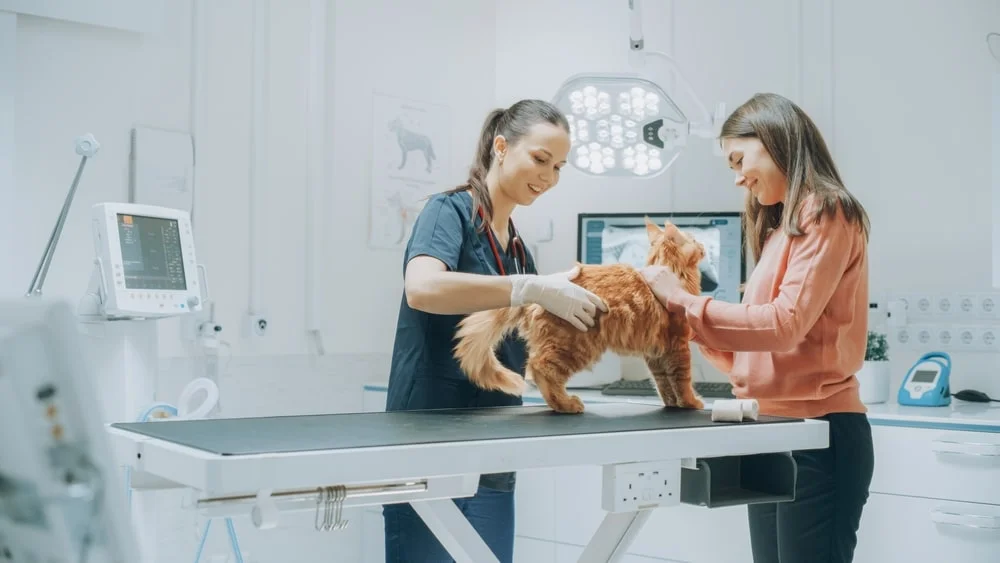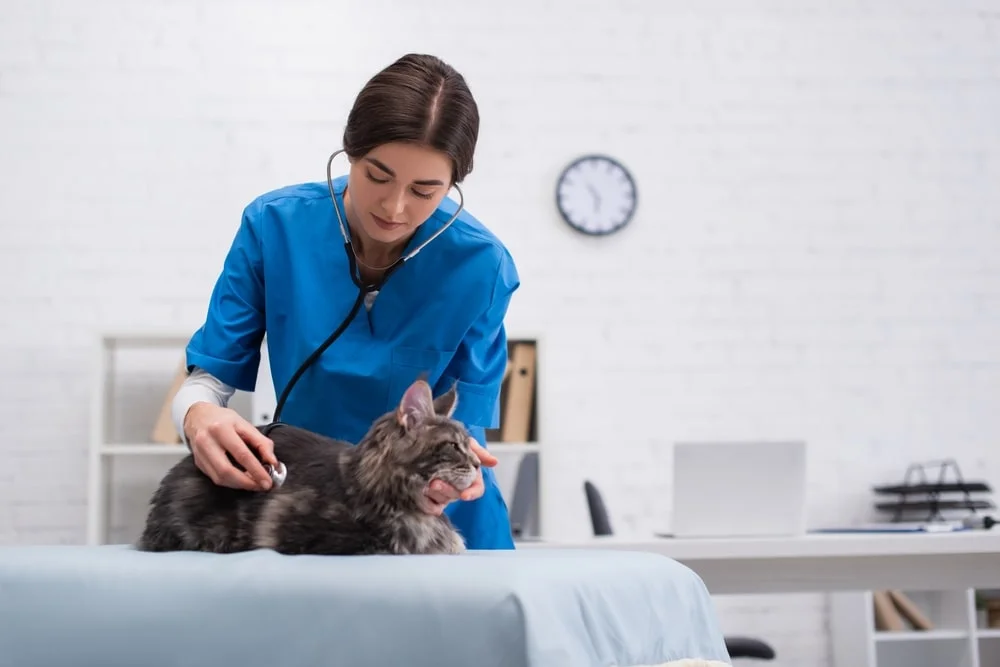PET HEALTH
Kidney disease in cats is an unfortunate reality for many pet parents. According to the Journal of Internal Veterinary Medicine, approximately 30% to 40% of cats aged 10 and older contract chronic kidney disease (CKD).1 What does that mean for all the cat lovers out there? Let’s take a look at the ins and outs of CKD, including what causes it, how to treat it, and how pet insurance might be able to help.
What Causes Kidney Disease in Cats?
CKD occurs when at least one of a cat’s kidneys becomes dysfunctional. Because kidneys are so efficient, you may not notice any symptoms until at least two-thirds of the kidneys have become dysfunctional. This becomes more common the older a cat gets; around 80% of cats older than 15 years develop CKD.2
When it comes to the cause of kidney disease, the culprit is not always clear. Rather than a disease in its own right, CKD can actually be the result of a variety of disease processes. These can include:2
- Malformation of the kidneys from birth, leading to congenital kidney disease
- Bacterial infection of the kidney, known as pyelonephritis
- Damage to the kidney’s filtration membrane caused by inflammation
- Kidney tumors
- Amyloidosis caused by an excess of protein in the kidneys
- Feline leukemia virus
- Feline infectious peritonitis virus (FIP)
- Kidney stones
- Urethral stones
Can kidney disease in cats be prevented?
There are several steps you can take throughout your kitty’s life to help keep their kidneys healthy and reduce the risk of CKD:3
- Keep them well-hydrated to flush out toxins. Many cats don’t like drinking water, so you can ensure they stay hydrated by feeding them wet food instead of or in addition to dry kibble.
- Maintain a healthy weight for your cat. This is another important step because obesity in cats may increase the likelihood of them developing CKD.
- Ensure they have easy access to their litter box. Regular urination helps remove harmful toxins that could damage their kidneys if left to accumulate. Make sure their litter box is in a quiet location with plenty of privacy.
- Bring your cat to the vet regularly for CKD screening. The earlier you catch kidney problems, the sooner you can begin treatment.
It’s important to note that none of these steps is guaranteed to prevent CKD. However, they could help slow its progression. If the disease is caught early and treated quickly, many cats are able to live long and active lives while you help manage their kidney disease.
Chronic Kidney Disease May Hurt Your Pet and Your Wallet
What Are The Symptoms of Kidney Disease in Cats?
When it comes to kidney disease, early diagnosis is crucial. This can be challenging, however. Clearer signs of CKD usually don’t become apparent until renal failure has advanced to a severe degree. Early warning signs, such as sudden weight loss and reduced coat quality, can easily be mistaken for aging. Other common symptoms include:2
- Bad breath
- Lower appetite
- Mouth ulcers
- Lethargy
- Depression
If you notice any of these signs, it might be time to take your kitty to the vet for a CKD screening.
What Are The Diagnostic Signs of Kidney Disease in Cats?
A kidney disease screening may involve your vet physically palpating your cat’s abdomen to feel for any irregularities in its bladder or kidneys. Ultrasound can also be used to get a better look. However, to accurately diagnose CKD, the vet will need to perform both a blood and urine analysis. The urine analysis looks for excess proteins, while the blood test identifies blood urea nitrogen and creatinine levels. Both can be clinical signs of CKD.2
Your vet may also recommend a newer blood test that could identify early warning signs of CKD. This test measures your cat’s levels of SDMA, a biological indicator for healthy kidney function. Elevated levels could indicate early renal failure, which could lead to CKD down the line.
If any of these tests indicate kidney disease, your vet will likely recommend you begin treatment right away. What that treatment looks like depends on how advanced your cat’s CKD is.
The 4 stages of renal failure in cats
Loss of kidney function progresses through 4 major stages. The timeline can vary, but progression generally includes:4
- Stage I: No apparent clinical signs
- Stage II: Some clinical signs
- Stage III: Numerous clinical signs, along with your cat frequently falling ill
- Stage IV: The majority of CKD clinical signs are present, putting your cat in serious danger
How To Treat Kidney Disease in Cats
There are many ways to treat kidney disease in cats. Your vet will likely recommend a combination of the following to manage the various symptoms of CKD:2
- Specialty diet: Managing your cat’s diet can reduce the amount of waste their kidneys need to process. Kidney diets include low-phosphorus foods and restricted, high-quality protein. Phosphate binders may be prescribed to help lower phosphorus levels in your cat’s bloodstream.
- Antibiotics: CKD cats can frequently develop bladder infections. Your vet may prescribe antibiotics and recommend routine urine tests to monitor for infection.
- Vitamin supplements: CKD often causes your cat to lose crucial vitamins, including potassium and B12. Supplements can help them maintain healthy levels, which may also slow the progression of kidney failure.
- Anemia treatment: Kidney disease can affect your cat’s ability to produce red blood cells, leading to anemia. Your vet may prescribe additional medication to stimulate your cat’s bone marrow and reverse their anemia.
- Subcutaneous fluids: In the later stages of CKD, your cat may not be able to stay hydrated by drinking or eating water-rich foods. Administering fluids to be absorbed subcutaneously (between the skin and muscle layers) can greatly improve their quality of life.
- Kidney transplant: Some cats are able to receive a kidney transplant. The procedure can cost thousands of dollars, assuming there are no complications. Because the donor cat is typically a shelter cat, you’re also required to adopt the donor.5
Your vet may prescribe any or all of these treatments. They may also recommend other forms of treatment, such as blood pressure medication to reduce kidney damage and antiemetics to prevent nausea. Such treatments can both slow the progression of CKD and improve your cat’s quality of life.
Kidney disease in cats: when to euthanize
This is a question that only you can answer. Your vet will be able to provide updates on your cat’s progression and prognosis, which can help inform your decision. Many cats can live happily for years after their initial diagnosis, but there may come a day when you need to choose between their quality of life and its length. It’s never an easy decision for pet parents to make, but it should always be done with the knowledge that you gave your cat the best life you possibly could.
Can Pet Insurance Help Cover the Cost of Kidney Disease?
Caring for a cat with kidney disease is not cheap:5,6
- Initial exams: $50 – $100
- Blood and urine tests: $100 – $400
- Ultrasound: $500 – $800
- Prescription food: $40 – $80 per month
- Medication: $20 – $60 per month
- Subcutaneous fluids: $40 per month if administered at home, $180 – $300 per month if done by the vet
- Kidney transplant: $4,500 – $8,000 (American Animal Hospital Association puts the cost even higher, at up to $15,000)
Any cat parent would gladly pay all that and more to help their fur baby, but sometimes it’s simply out of their price range. The good news is that you don’t have to face these burdens alone. A cat insurance plan could help cover some of the heaviest costs involved in treating your kitty’s kidneys.
How MetLife Pet Has Helped with Kidney Disease Costs
Take the case of Pickles the cat. This senior feline was suffering from advanced kidney disease and had to be hospitalized for treatment. To say the bill came with sticker shock is an understatement: the total cost was over $6,000. However, thanks to their cat insurance policy from MetLife Pet, Pickles’ family paid less than half of that out-of-pocket. The rest of the bill — nearly $4,400 — was covered by their insurance.7
Pickles also needed specialty food to keep her kidneys healthy. Without insurance, it would have cost her parents over $100 per month. With MetLife Pet, they got Pickles an entire month’s supply of prescription food completely covered.7
For more information on how we can help provide for your furry family, read our article on how pet insurance works. Then, fetch a quote to get started.


